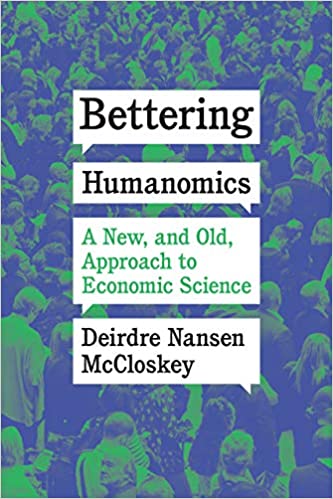World War Two
Published 13 Jul 2021How did Germans with Jewish heritage still serve in the Luftwaffe? And what happened to the Allied POW’s from the German invasions of France and Belgium? And what the hell happened with those tiny Vichy islands near Canada? We answer all of this in today’s Out of the Foxholes.
(more…)
July 14, 2021
Jewish Luftwaffe Officers, Allied POW’s, and Vichy Islands near Canada – WW2 – OOTF 023
Instead of economics, how about “humanomics”?
In City Journal, Allison Schrager reviews Bettering Humanomics: A New, and Old, Approach to Economic Science by Deirdre McCloskey:
I thoroughly enjoyed Deirdre McCloskey’s Bettering Humanomics, but I may be a glutton for feelings of intellectual inadequacy. Truth be told, I only understood about 60 percent of the book. It contains countless references to great works of the humanities, economics, and the history of economic thought. A casual reader cannot possibly be familiar with a fraction of them, even within his own field. But McCloskey expects you to know them.
At first this book frustrated and confused me. Then I suspected this reaction was by design. I am, after all, an economist myself: I have dedicated my life to learning my craft and benefited from many years of training at great institutions from important thinkers. But reading Humanomics, I became fully aware of how little I know. I now believe that becoming a fully formed economist requires that I stop watching trash TV in my free time and read the Theory of Moral Sentiments instead. McCloskey pulls no punches, whether on her intellectual opponents or on the reader. Here is one example, where she defends herself from a critic, philosopher Gerald Gaus:
Aside from these textual matters, I must say I find myself repelled by Gaus’s vision of people as cynical conformists: “we are such deeply social normative creatures, in the sense that we are so attuned to the normative expectations of others, that we can achieve a stable rule-based system of cooperation even when many are not enthusiastic about the moral attitudes and virtues that the rules express.” I invite him to reread Thucydides’s dialogue between the Athenian diplomats and the Melians, and repent.
McCloskey argues that economics would be better if we listened to people — in controlled experiments, chat rooms, meetings, surveys, and at the Rotary. We need to absorb the lessons from art and culture (perhaps trash TV has value, after all). She does not believe that economists need to ditch math and data, but our overreliance on these tools encourages us to view people as abstractions and leads us astray. Such tendencies also help explain the rise of behaviorism, which assumes that humans are flawed creatures who must be nudged by a wise bureaucrat into better choices; recent flirtations with industrial policy; and the belief that, if we just get our government and laws right, growth will follow.
We must consider how individuals see and experience the world around them, and we must recognize that humans are malleable in ways that we don’t account for. For example, McCloskey estimates a quarter of all income comes from “Sweet Talk” — not lies or trickery, but the ability to be persuasive and compelling, a crucial aspect of sales and advertising. It influences how we perceive the world and can be an important part of motivation.
We economists have lost our appreciation for the humanities, and that means that we underestimate the importance of human dignity. This is no small oversight. McCloskey spends about a third of her book arguing that understanding the humanity of the northwestern European population can explain why it industrialized first. Other countries around the world had wealth, strong institutions, and well-trained mathematicians and engineers (perhaps better ones), but industrialization happened in Britain first because it treated its people with dignity and empowered them with both rhetoric and knowledge.
Tank Chats #115 | A34 Comet | The Tank Museum
The Tank Museum
Published 8 Jan 2021Join The Tank Museum’s Historian David Fletcher has he discusses the A34 Comet, widely regarded as the best tank Britain produced during the Second World War.
Support the work of The Tank Museum on Patreon: ► https://www.patreon.com/tankmuseum
Visit The Tank Museum SHOP & become a Friend: ► tankmuseumshop.orgTwitter: ► https://twitter.com/TankMuseum
Instagram: ► https://www.instagram.com/tankmuseum/
#tankmuseum #tanks
QotD: The unlikely hermaphrodites in The Left Hand of Darkness
I’m strange only in that I was very young and that the book that caused this reaction was a classic of science fiction, The Left Hand of Darkness.
Let me start by saying that I LIKED the book. Loved it even. Mostly because it was different and it made me think. (Like other books of the time, it didn’t age well, mostly on language, but also structure, which I guess was innovative and daring at the time, but strikes me as “too early seventies” for words. Now this might be JUST ME but there’s a whole batch of books — one Heinlein — I can’t stand to re-read. I came of age in the seventies and eventually grew to loathe that false-craft feel of art at that time. No one else is forced to agree with me.)
But part of what made me think — because my relaxing reads are books on evolution and animals and their biology and behavior (guys, I read Konrad Lorenz for fun) is that the left (and at the time anyone with even vague intellectual pretensions was at the very least soft left, because the zeitgeist was) was very funny about humans.
They often opened their books on humans by gesticulating broadly at imaginary religious fanatics and rubbing said fanatics’ noses in the fact that “we are animals. No, we’re really animals.” And then proceeded to go a little bananas, sometimes in supposed non-fiction, like Desmond Morris in The Naked Ape, which assured us only humans killed their own species, or something equally ridiculous (I read it at around 14 or 15, I just remember his thesis that humans were uniquely vile made me snort-giggle at the time. Because, you know, you can sustain that if you’re religious, and say humans should aspire to the divine image, but if we’re really just animals, there is NO vile. We do what instinct and nature tell us, no judgement, right?)
But mostly this dysfunction showed in science fiction, particularly at the time. “We’re just animals. If we just changed/removed/tweaked x y z we’d be communitarian, sharing, no war animals.”
The way hermaphrodites behave in TLHOD made me snort/giggle too for various reasons, the first being that hermaphrodite species on Earth (granted mostly very small) have some of the most violent mating behaviors in the world. Makes sense since at least in live-bearing, or for that matter those who care for eggs, species, the cost falls on the one who carries young or sits on eggs. The other one just goes off, whistling his merry way and lives to mate another day. So in a species where either of the couple can bear, there would be a “war” (There are several books on war of the sexes in various species, which has led to things like praying mantises and duck penises.) to determine who bears. And yes, she did get right that in an intelligent species, value would have to be put on children-of-the-body or no one would want to do it. (Or most children would be conceived by rape. Which to be fair, is most hermaphrodite species on Earth.)
What she got wrong, related to that, is then having the kids raised in some sort of hippie dippie commune.
In fact, the whole setup makes perfect sense as a professional woman’s fantasy. “I want to have kids, but someone else raises them, and it will be the perfect communitarian family and no one will think it’s bad if I’m not there, or take no more interest in them than in any of the family kids.”
In point of fact, from evolutionary POV, an hermaphrodite species would have a hell of an attachment to their own biological “of the body” kids, for the simple reason that otherwise, being intelligent and able to circumvent instinct, no one would have kids “of the body” and those born of rape would be abandoned to die. World’s shortest species/race/breed.
Yes, I’m sure that some human (and these were supposed to be modified humans) tribes have done the communitarian child raising, but it’s not the norm, it’s not usually as communitarian as it looks and … oh, heck, even extended family raising the kids, which it sort of is, is nowhere nearly what US leftists think it is. There’s squabbles, politics, and the mothers very much care and “pull” for their own kid.
Anyway, it amused me because it was nowhere near the only. There was this trend back then for hermaphrodite modified humans that somehow made them more cooperative/better at not warring, etc, which I found absolutely mind bogglingly bizarre and made me wonder why people thought injecting the fierce young-protecting instinct of the female into a species at large would make it more sharing and caring, not the other way around. (And lord, study any society with multiple concubines and wives. Women protect THEIR children, there is no sisterhood or love all babies, when yours is in the mix. Some of the most horrific tales of mankind are the vengeance wrought by a woman on rival women AND THEIR BABIES.)
Sarah A. Hoyt, “Remaking People”, According to Hoyt, 2018-11-19.





